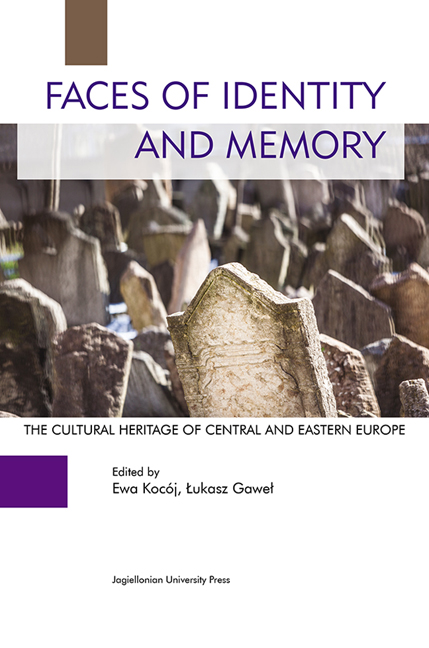 Faces of Identity and Memory
Faces of Identity and Memory Book contents
- Frontmatter
- Contents
- Introduction
- Memory and Identity. Monuments of Romanian Tangible Culture Inscribed on the UNESCO World Heritage List (a Short Presentation)
- Inventorisation and Recording of Sacral Art Objects in Lithuania in 1995–2005
- National lieux de mémoire and the European Heritage Label. Some Reflections on the Case of the Gdańsk Shipyard
- Porrajmos. Constructing Gypsy Holocaust Memory in the Recent Cinema
- The Vacuum and the Imagination of Space. The Cultural Role of the Żyznowski Publishing House
- Cultural Animation as the Art of Remembering. The Activities of the “Borderland of Arts, Cultures and Nations” Centre in Sejny
- ‘The Painted Village’ – Zalipie as an Expression of Ethnographic Tourism in the Powiśle Dąbrowskie Region of Poland
- 20th Century Theatrical Heritage: The Escape from Illusion
- Protection of Cultural Heritage. The Case of Krakow
- Managing an Artist's Legacy on the Example of Foundation for Support of Modjeska's Life and Art Research in Kraków
- Culinary Heritage as Used in the Present. Selected Elements of the Culinary Heritage Management in Contemporary Poland
Cultural Animation as the Art of Remembering. The Activities of the “Borderland of Arts, Cultures and Nations” Centre in Sejny
Published online by Cambridge University Press: 10 January 2018
- Frontmatter
- Contents
- Introduction
- Memory and Identity. Monuments of Romanian Tangible Culture Inscribed on the UNESCO World Heritage List (a Short Presentation)
- Inventorisation and Recording of Sacral Art Objects in Lithuania in 1995–2005
- National lieux de mémoire and the European Heritage Label. Some Reflections on the Case of the Gdańsk Shipyard
- Porrajmos. Constructing Gypsy Holocaust Memory in the Recent Cinema
- The Vacuum and the Imagination of Space. The Cultural Role of the Żyznowski Publishing House
- Cultural Animation as the Art of Remembering. The Activities of the “Borderland of Arts, Cultures and Nations” Centre in Sejny
- ‘The Painted Village’ – Zalipie as an Expression of Ethnographic Tourism in the Powiśle Dąbrowskie Region of Poland
- 20th Century Theatrical Heritage: The Escape from Illusion
- Protection of Cultural Heritage. The Case of Krakow
- Managing an Artist's Legacy on the Example of Foundation for Support of Modjeska's Life and Art Research in Kraków
- Culinary Heritage as Used in the Present. Selected Elements of the Culinary Heritage Management in Contemporary Poland
Summary
Abstract: The author refers to the experience of the “Borderland of Arts, Cultures and Nations” Centre in Sejny, active on the Polish-Lithuanian borderland, and illustrates how the animation of culture can deal with the “difficult memories” present in Central and Eastern Europe, as well as how this work can support people in developing their identity. In this sense the animateur becomes a humanist – comprehensively educated, conscious of the intellectual and personal development of both him/herself and others. Having in mind the uniqueness of such undertaking, it is also important to notice that the original formula of such a center – developed according to its leaders’ personal ideas – may become an identifying mark of Polish culture.
Keywords: socio-cultural animation, culture of remembering, “Borderland of Arts, Cultures and Nations” Centre in Sejny
The “Borderland of Arts, Cultures and Nations” Centre in Sejny was founded by Krzysztof and Małgorzata Czyżewski and Bożena and Wojciech Szroeder. Although its unique program (based on the creators’ original concept) aims at concentrating on history and memory in a specific place and within a specific community, its achievements and impact reach far beyond the local context. Today the “Borderland” Centre is a cultural laboratory of major importance and its methods and philosophy are an inspiration and model for similar undertakings throughout the world. Several awards, such as the Małe Berło Kultury Polskiej (The Little Scepter of Polish Culture, 1999), ProfessorAleksander Gieysztor's Award (2007), The Honorary Jerzy Giedroyć Award (2008) and in 2014 The Dan David Prize confirm the aforementioned. It is noteworthy that the latter prize is awarded for exceptional achievements in science, arts and social activities in relation to three time dimensions: Past, Present and Future. Every year, a particular theme is assigned to each dimension and the laureates are chosen from within these fields. In the year when Krzysztof Czyżewski was distinguished, the common theme was Memory/ Mind and the individual categories were: History and Memory (Past), Combating Memory Loss (Present) and Artificial Intelligence (Future). The co-founder of the “Borderland” Centre was the laureate in the Past category together with historians Pierre Nora and Saul Friedlander.
- Type
- Chapter
- Information
- Faces of Identity and MemoryThe Cultural Heritage of Central and Eastern Europe (Managing and Case Studies), pp. 113 - 122Publisher: Jagiellonian University PressPrint publication year: 2015
